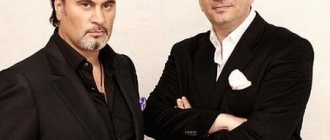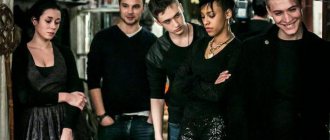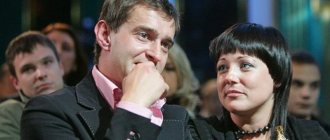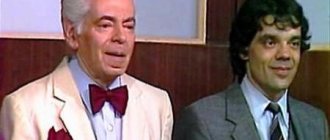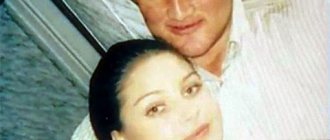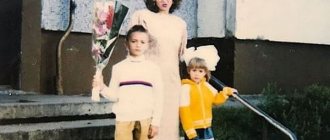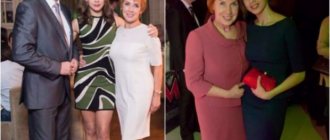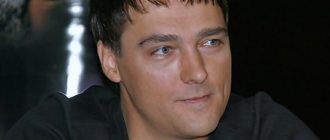Troubled childhood
The date of birth of Kostya Kinchev (December 25, 1958) is celebrated by fans of the Alisa group as the biggest event. This was also a significant moment for the family. Kostya is the only child in a family of teachers. My parents taught at universities, my mother taught at the Institute of Chemical Technology named after. Mendeleev, father - at the Moscow Technological Institute. The family was quite wealthy and intelligent, but the child turned out to be very restless and active. Already as a child, he was a leader in the yard; at the age of 7, he persuaded his comrades to go in search of pirate treasures. The fugitives were found in Tula. He read a lot, Kinchev’s childhood idols were Chingachgook and the pirate Silver, the boy dreamed of defending justice.
The parents took the active child to the hockey section, which he practiced seriously for several years, but, realizing that he could not achieve high results, he left the sport.
Biography
Konstantin Kinchev was born on December 25, 1958. At birth, the future artist received his father’s surname – Panfilov, but later took his grandfather’s surname. He decided to take this step in 1976, when he learned the story of his grandfather: in the 1930s he was repressed and died in Magadan.
In the photo: Konstantin Kinchev in his youth
In 1966, a general education institution appeared in the biography of Konstantin Kinchev. As a child, the boy was a hooligan and ran away from home. For example, at the age of seven, he and his friends went looking for treasure. Police officers removed the children from the train in Tula. According to the musician himself, at that age he dreamed of becoming a pirate.
Until 1972, he was actively involved in hockey, but one day he realized that he would not be able to achieve any heights in this field. Already at the age of fifteen, he began listening to rock and began collecting music records. Gradually, he began to write his own compositions, which played a role in his future career, because he realized that in the future he would definitely become a rock star.
“As a child, I was such a spoiled child. I'm even ashamed of myself now. But then I couldn't do anything about it. Where friends go, so do I. We've done so much. I especially remember the escape. We then wanted to find a treasure, a lot of money and give it to our parents, but they scolded us. Now I understand that we could have gotten lost, etc., but before...”
After graduating from school, he became a student at the Moscow Institute of Technology. At the same time, I studied at the school at the Bolshoi Theater for a year. Later he became a student at a jazz studio in Zamoskvorechye. From 1977 to 1980 he was a student at the Moscow Cooperative Institute.
Before joining the musical group "Alice", Konstantin Kinchev played in several groups, including "Golden Mean", "Third Fan Team" and "Circle of the Black Half". Already in 1983, the group “Recreation Zone” appeared, which performed compositions exclusively by Kinchev. At the end of the same year, the “Alice” team was formed. A year later, Kinchev became the vocalist of this group. According to some members of the group, they did not immediately like Konstantin’s performance, but later he showed his talent 100% and joined the group perfectly.
The Alice group exists to this day. Until now, the members of the group have managed to record many albums, which have gained considerable popularity among the public.
Passion for music
When Kostya Kinchev went to school, his parents bought him a tape recorder, hoping that it would help their son learn English, but the boy preferred to listen to records of the Rolling Stones. This is how his love for rock music began. At the age of 14, Kostya had a chance to relax in a pioneer camp, and there he first heard the music of Black Sabbath. This event turned the teenager’s life upside down; he firmly decided to become a rock star, covered all the walls of his room with portraits of Ozzy Osbourne and grew his hair long. I had to give up my hairstyle due to school requirements, but my love for music remained for the rest of my life. Under the influence of his idol, Kinchev writes his first compositions in the heavy metal style and plays in a band at a plastic products factory.
After school, Kinchev tried himself in different types of activities, even studied for a year at courses for soloists at the Bolshoi Theater, changed many jobs - from a model at the Surikov School to a milling machine operator, and studied at several universities. All this chaotic activity was only the external side of internal quests. At the same time, Kostya Kinchev plays in different groups: “Golden Mean”, “Circle of the Black Half”, “Recreation Zone”.
Kinchev, Konstantin Evgenievich
Youth
Konstantin Kinchev was born on December 25, 1958 at about one in the morning in Moscow, on Gorky Street[6]. Father - Panfilov Evgeniy Alekseevich, Doctor of Technical Sciences, rector of the Moscow Institute of Technology (now the Russian State University of Tourism and Service[7]). Mother - Lyudmila Nikolaevna, a mechanical engineer, taught strength of materials at the Moscow Institute of Chemical Technology named after D. I. Mendeleev (now Russian Chemical Technology University named after D. I. Mendeleev).
In 1966, Konstantin went to first grade at school No. 49. At this time, his mother bought him a Dnepr tape recorder to interest her son in the English language, as a result of which he began listening to The Rolling Stones. At the age of seven, Kostya ran away from home: while playing pirates, he told his peers that he knew where to look for treasure, and the boys were taken off the train in Tula[8]. According to the musician, at that period of his life he dreamed of becoming the Indian Chingachgook fighting for justice or the one-legged pirate Silver[9]. A little later, Konstantin began to get involved in hockey, and played this sport until 1972. For a certain period, he trained at Spartak, but then he assessed the situation and, realizing that he would not reach heights in this area, left hockey[10].
At the age of fourteen, Konstantin decided to join the Komsomol to prove to his parents that he had become an adult[11]. In the eighth grade, Kostya was expelled from this organization because he came to school inappropriately the day after his friend’s farewell to the army. The student was given a personal file and told not to come to school until he had his hair cut, to which he replied “okay”, went to the hairdresser and cut his hair bald[11].
At the age of fifteen, in the Zvezdochka pioneer camp, Konstantin heard Black Sabbath, and after that he began collecting records. At that time, Constantine's room was painted with portraits of Ozzy Osbourne, cobwebs and spiders[12]. The first compositions of their own composition in the style of Black Sabbath began to appear. The trip to the camp influenced the future of Konstantin, who made his life choice and decided that he would be a rock star[10]. In 1973, the musician, as a bass guitarist and backing vocalist, became part of a group formed at a plastic products factory opposite the school[6].
After school, Konstantin worked as an apprentice miller, an apprentice draftsman and a graphic designer. Then he entered the Moscow Institute of Technology (now the University of Tourism and Service) at the Faculty of Economics and Finance. At the same time, I studied for a year at the singing school at the Bolshoi Theater [1], which I got into by accident: while relaxing in a pub at VDNKh, a stranger heard Konstantin singing and invited him to take part in a competition. The next day he went through the first round, performing the songs “Shine, burn, my star” and “Oh, it’s not evening, but it’s not evening” to the piano. The school implied a four-year course, of which Konstantin studied for a year. After leaving, the musician simultaneously worked as a model at the Surikov School, a loader in a bakery and an administrator for a women's basketball team. It is also known that for some time Konstantin studied at a jazz studio in Zamoskvorechye. The musician avoided conscription into the army under the article “residual effects of traumatic brain injury”[12]. From 1977 to 1980, Konstantin studied at the Moscow Cooperative Institute (now the Russian University of Cooperation)[13].
Beginning of a musical career
Before joining Alisa, Konstantin Kinchev played in several Moscow groups - “Golden Mean”, “Circle of the Black Half” (1974), “Third Fan Team” (1974). In Tushino, Konstantin created his own group “Broken Air”, which performed Western rock classics at dances in the city of Krasnogorsk. Two years later the group broke up. None of these teams left behind any recorded material. In 1983, the group “Recreation Zone” appeared, performing only songs by Konstantin Kinchev. The group recorded a magnetic album, but it was not preserved[8].
"Nervous Night"
Autograph of Konstantin Kinchev
At the end of 1983, two groups broke up in Leningrad - “Crystal Ball” and “Democritus Well”, from the fragments of which Svyatoslav Zaderiy assembled a new group called “Alice”. In addition to Zaderii himself, who played the bass guitar, it included: Boris Borisov - saxophone, vocals; Mikhail Nefedov - drums; Andrey Shatalin - guitar; Pavel Kondratenko - keyboards. With this composition they recorded the first magnetic album “Krivozerkalye” and performed at the II rock festival of the Leningrad rock club. Immediately after the festival, vocalist Boris Borisov left the group[14].
At this time, in 1984, Konstantin Kinchev moved from Moscow to Leningrad, where he met sound engineer Igor “Panker” Gudkov, who by that time had managed to record Mike Naumenko’s solo work “LV”. Gudkov introduced Konstantin to Mike, and after listening to the young musician’s repertoire, he said that “this has a right to exist”[8].
After this, it was decided to record the entire repertoire in an album. Before the start of the “Nervous Night” session, the following line-up of musicians was assembled in the LGITMiK studio: Konstantin Kinchev - vocals, guitar; Andrey Zabludovsky (“Secret”) – guitar; Svyatoslav Zaderiy (“Alice”) - bass; Alexey Murashov (“Secret”) - drums. Gudkov acted as sound engineer. The recording began at noon on July 23 and ended at two in the morning the next day.[15]
The album was released to the people under the title “Doctor Kinchev and the group Style
" Officially, “Nervous Night” was released only in 1994 by Frost Records as part of the complete release of all “Alice” albums. This release included two bonus tracks - “Tomorrow May Be Late” and “Thief and Executioner” from the band’s acoustic performance in Perm in the spring of 1988[15].
"Alice"
First years in the group
After recording “Nervous Night,” Svyatoslav Zaderiy invited Konstantin Kinchev to “Alice” for the vacant position of vocalist. Rehearsals for the new band began in December 1984. According to drummer Mikhail Nefyodov, at the first listening he didn’t really like Konstantin’s work, but Svyatoslav Zaderiy insisted on trying to rehearse together. The very next day his opinion changed dramatically:
“Kinchev arrived, so modest. And you know, from the first rehearsal it somehow went smoothly, we immediately did six things in one sitting - the basis of the future “Energy” program.”[16].
In 1985, on March 14, at the Third Festival of the Leningrad Rock Club, Konstantin Kinchev’s first performance as part of the group “Alice” took place. At the initial stage, the musician only agreed to help the group record a new album, and planned to perform energetic songs in “Alice”, and calmer ones in another group[16]. Svyatoslav Zaderiy, who was the leader of “Alice” at that time, tried to reshape the newcomer in his own way, which did not suit Konstantin at all, and became the beginning of their confrontation. At the beginning of 1986, the first album of “Alice” was released with the participation of Konstantin Kinchev, entitled “Energy” (officially published by Melodiya in 1988). In June 1986, Svyatoslav Zaderiy, having lost the struggle for leadership to Konstantin Kinchev, finally left Alisa[16].
In 1986, Konstantin Kinchev took part in the filming of the film “Burglar”. According to the musician, he is dissatisfied with his performance and agreed to star in the film only in order to get away from being accused of parasitism. For his participation in the film, Konstantin Kinchev received the title “Best Actor of the Year” at the Sofia International Film Festival[16]. Also, the leader of “Alice” can be seen in the films “Walk the Line” and “Ya-Hha”[17][18].
In 1987, the album “Block of Hell” was released, which, according to Konstantin Kinchev, unlike “Energy,” already reliably conveyed the state of the group[16]. On the new album, for the first time, the individual style of Konstantin’s lyrics was clearly expressed[16]. The song “Red on Black” also defined her fans.
In the fall of this year, Konstantin Kinchev visited the Pskov-Pechersky Monastery with a cross burned with peroxide on his head, for which the monks fumigated him with incense and kicked him out[19]. After returning from a tour, walking down the street with his cousin Kirill and Nina Baranovskaya, Konstantin clung to the side of a moving truck and barely survived. Later he explained: “I was crying with delight there... I went there... And they... With a censer... Like a demon...”[20].
In the same year, regular touring activities began to take shape, and during one of the performances a scandal occurred, known as the “Kinchev Affair”.
"The Kinchev Case"
In 1987, the Alisa group began to experience problems with the authorities, the apogee of which was the Kinchev Case. On November 17, 1987, before the band’s concert at the Yubileiny Sports Palace in Leningrad, Konstantin Kinchev got into a fight with police officers who did not let his first wife, Anna Golubeva, who was pregnant at that time, go backstage. After this, the leader of “Alice”, before starting to sing the song “Hey, you, there, on the other side,” made an introduction: “The next song is dedicated to foreign guests, if there are any in the hall... as well as to the cops and other bastards!”[21]
On November 22, the Smena newspaper published an article by Viktor Kokosov, “Alice with a sideways bang,” in which Konstantin Kinchev was accused of provoking riots and promoting Nazism. It was alleged that the leader of “Alice” sang “Heil Hitler on the other bank!” in the song “Hey, you there, on the other bank!”[22].
and on December 22, a continuation of the article was published, as well as a letter from the Lenconcert artists (Edita Piekha, Ben Bentsianov and David Goloshchekin and others[23]), who accused Konstantin Kinchev of disrespect for the public. The founder of the Aquarium group, Anatoly Gunitsky, spoke in support of “Alice” and o[24].
After an active discussion of the incident in the press and on television, “Alice” began to have problems organizing concerts. On February 8, 1988, the group sued Smena for libel, and Konstantin Kinchev, his wife and the wife of the guitarist of the Beat Quartet “Secret” Andrei Zabludovsky Ada Bulgakova-Zabludovskaya filed a complaint with the prosecutor’s office against the actions of the security guards. At the same time, an investigation is underway into the actions of Konstantin himself. At the end of February, he and other members of the group were summoned for interrogation several times. As a result, Konstantin was charged with malicious hooliganism and released on his own recognizance[20].
On March 7, Konstantin Kinchev was arrested at the apartment of the director of “Alice” Alik Timoshenko, tied up and taken to the police station. The next day the musician was released, but was taken away again for one day on March 10. The next day, the group went to a concert in Pskov, despite the fact that the leader had a written undertaking not to leave Leningrad. Upon returning from the tour, Konstantin was detained for seven days, and the group was prohibited from giving performances for six months[16]. Also, despite a written undertaking not to leave the place, Konstantin Kinchev, together with bass guitarist Pyotr Samoilov, followed the Tonvagen mobile studio to record the album “The Sixth Forester,” which was released in 1989[25].
On July 11, a court hearing was held, at which, after listening to an audio recording of the concert, the accusations of Nazism were confirmed to be unfounded. By October 1988, both processes were completed. Kinchev’s case was dropped, and he himself was given bail to the Leningrad rock club. The Smena newspaper, without waiting for the court's decision, published a refutation and apology on September 24. Impressed by the events, the group “Alice” recorded the album “St. 206 part 2", which was published only five years later - in 1994[26].
Subsequent events
On February 17, 1988, the rock bard and friend of Konstantin Kinchev, Alexander Bashlachev, voluntarily gave up his life. The leader of “Alice” was grieving the loss of his friend, and the theme of retribution for excessive freedom began to appear in his work for the first time[16]. Immediately after the death, the song “Shabash” was written, named by combining two syllables of Bashlachev’s first and last names: SaSHA BASHlachev. In 1991, an album of the same name was released, which became the first double-disc concert in the history of Russian rock[16]. Konstantin Evgenievich repeatedly said that he learned from Bashlachev to be careful with words[27].
In August 1991, during the putsch, Konstantin Kinchev took part in the defense of the White House in Moscow. In order not to disturb his wife, the musician told her that he would go to conclude an agreement at the stock exchange, and later called, explaining that he was going to Mytishchi to pick up equipment. At first, with a stake in his hands, Konstantin joined the cordon, after which, in his own words, he realized that he looked like a complete idiot and asked for a guitar[28].
In 1992, the group “Alice” went to perform a concert in Jerusalem. At the concert itself, an incident occurred that received publicity in the local press: addressing the audience, the leader of “Alice” said that “the Messiah was missed 2,000 years ago, and he will never return,” and also that “this sinful era will soon pass and another will come.” “The Age of the Holy Spirit.” The audience took the statement personally, and the newspaper published an article claiming that Konstantin Kinchev spat in the face of the Jewish state[16].
During a week-long stay in the city, Konstantin Kinchev visited all the holy places and, in his own words, “was imbued with this spirit.” Upon his return, Konstantin Evgenievich converted to Orthodoxy[8], being baptized on September 30 in the Church of the Life-Giving Trinity in Ostankino. After this event, many issues were reassessed. Kinchev also began to struggle with drug addiction, which ended with positive results in 1994. According to the musician, this was only possible with God’s help: “I confessed, asked and fell again […] I thought: “You scoundrel, you’re lying to God himself,” burning shame accumulated in my heart […], then the intervals between falls became longer and longer and more, and then stopped completely”[8]. In April 2000, Kinchev stopped drinking, and later quit smoking several times during Lent[27][29]. Also, guided by the thought of Anthony of Sourozh “the body is the visible part of the soul,” the musician began going to the gym, and later built his own in his village[30].
At the same time, political beliefs changed: previously Konstantin Kinchev called himself an anarchist[31], later he began to adhere to monarchist views. Answering numerous questions from journalists, the leader of “Alice” explained the changes as follows: “This is the path of evolution of a thinking person. The path that our Motherland has passed is from paganism, the worship of the elements to orthodox Orthodoxy”[32].
In 1993, Konstantin Kinchev received the “Defender of Free Russia” award from the hands of Russian President Boris Yeltsin. It was intended to persuade the president to make a “goat,” but the plan was not put into practice. A year later, the musician officially returned the award, thereby protesting against the murder of journalist Dmitry Kholodov and the outbreak of hostilities in Chechnya[33].
On April 12, 1993, an event occurred that had an impact on the future of the group: guitarist Igor Chumychkin committed suicide. All members of the group took this loss seriously, and after a performance in memory of Igor in November, “Alice” stopped concert activity for almost a year, resuming it only in 1994[34]. In 1994, in memory of the guitarist, the album “Black Mark” was released, which included four songs he wrote. According to Konstantin Kinchev, Igor’s death made him think about his own life, straighten it out and resist: “Poor Igor, he had to sacrifice himself to save us. Thank you and eternal memory."[35] Also this year, at the Mukha studio, Voronezh artist Alexei Nikanorov drew comics “Black Mark”, “For Those Who Fell from the Moon” and “Earth”, the main character of which was Konstantin Kinchev.
Tour “For the Future of Free Russia” 1996
In 1996, "Alice" took part in the "Vote or Lose" tour. Yuri Shevchuk reproached the event participants for venality, Konstantin Kinchev explained that the idea was to prevent the revival of communism in the country, and the group’s fee did not exceed the usual payment for a concert[36]. Also this year, the album “Jazz” was released, containing songs that Konstantin played at apartment concerts during the Soviet period of his life.
In 1998, during a concert of “Alice” at the Meridian cultural center, a scandal occurred. After fans lived in the musician’s entrance for two weeks, drinking and relieving themselves without leaving the place, Konstantin Kinchev could not stand it and addressed the audience with the following words: “I’m tired of being a singer for bastards. There is no desire to see your faces, because you behave like pigs, scum and freaks. I've been trying to reach hearts for fifteen years. Something that disturbs my own heart can be born in my soul, but I run into the stupid resistance of bastards and scum. The cup of patience is at its limit, guys: either you change and finally become people, or Kinchev will not be there for you pigs.” After this, the leader of “Alice” publicly apologized to the fans several times, explaining to them that he could not restrain himself and lost his temper, and that he had long wanted to eradicate this sin at its roots[37].
In 1998, the album “Geopolitics” was recorded, which was the result of collaboration between Konstantin Kinchev and Alexander Aksenov. The album includes Konstantin's songs in a techno arrangement. Due to financial problems, the publication of Geopolitika was delayed for more than a year. According to the leader of “Alice,” this album is “pampering and a toy”[38].
In the new millennium
Konstantin Kinchev (concert of the group “Alisa” in Kazan, May 2, 2010)
In 2000, the album “Solstice” was released, due to the design features of which Konstantin Kinchev was accused of fascism. The radio station “Our Radio” refused to broadcast songs from the album, protesting against the left-sided swastika depicted on it. Konstantin Kinchev explained that the symbol means gaining the grace of the Holy Spirit and suggested sticking a sticker on the CD with a quote from the song “Totalitarian Rap” - “I am an anti-fascist,” but “Nashe Radio” did not change its position[39].
In March 2001, the Eksmo publishing house published a book of poems by Konstantin Kinchev, “Solstice.” At the insistence of the leader of the “Alice” group, the texts are grouped not according to the date of their writing, but depending on their internal content. In total, the book has ten semantic sections: “Noon”, “Finist”, “Nate”, “Asphalt”, “All this”, “Salt shakers”, “Reality”, “Siverga”, “Grains” and “Salt”. Also in the book you can find original graphics by the Moscow artist Manshavina and color and black and white photographs from the personal archive of Konstantin Kinchev.
In 2003, the album “Now Later Than You Think” was released. One of the songs from the album, “Dirt,” caused strong responses in the “Questions” section on the official website. In this song, Konstantin Kinchev talks about where and what he sees as “dirt.” A fragment of a Jewish folk melody was used as a solo for the song. Answering the questions “why do you think that Jews are to blame for all the troubles of Russians,” the leader of “Alice” explained that this song exposes “rootless cosmopolitanism, demanded and necessary for a “society of total consumption,” “a society of unbridled permissiveness” and “open fight against God "". Konstantin also said that among his co-religionists there are a considerable number of Jews and none of them associate themselves with this song[40].
In 2004, “Book of Photographs” was published. Kinchev-Potapov”, which included photographs from different years.
In 2007, during the presentation concerts of the album “Becoming the North,” the group “Alice” performed the song “Power,” which touched on the revolutionary events in Ukraine, after which articles appeared in the local press that Konstantin Kinchev would be banned from entering the country[ 41]. Also this year, Konstantin Kinchev gathered a huge number of Russian rock musicians to record the song “Rock-n-Roll is us.”
In 2008, on the eve of the presentation of “Pulse of the Guardian of the Doors of the Labyrinth,” Konstantin Kinchev said that he would be glad to play a concert in support of the Serbs on the Kosovo issue. Soon the director of the group, Mikhail Ryabov, received a call from a man who proposed organizing a concert in Belgrade. The event was originally planned to take place on May 9, but due to technical reasons the date was moved to June 28, the day when Serbia mourns those killed in the 1389 battle. In addition to other songs, “Alice” performed “Sky of the Slavs” and “Rebellious”.
After the death of his close friend Alexander Aksenov, Konstantin Kinchev decided to make a tribute album, work on which took place in 2009. Various musicians were invited to record: Ilya Lagutenko, Guf and Smokey Mo, Lyusya “Mother-in-law” Makhova, Sergey Shnurov, Anton “Pooh” Pavlov, Dan Kalashnik, Garik Sukachev, Nikita Alekseev, Mikhail “Gorshok” Gorshenyov, Andrey “Prince” Knyazev , Alexander "Chacha" Ivanov, Ilya "Devil" Knabengof. The Enter the Dragon tribute was born in 2009.
On April 29, 2020, the singer was urgently hospitalized at the clinic named after. Almazov St. Petersburg with a heart attack and was operated on at the same time. In this regard, the May concerts were canceled or postponed until the fall[42][43]. In mid-May of the same year, he was discharged from the hospital with doctors’ recommendations for further rehabilitation[44].
At the end of 2020, Kinchev said in an interview that he had recovered from his illness and returned to work, but admitted that “it will no longer be possible to jump around the stage as before”[45].
After the release of “Alice’s” album “Posolon,” Kinchev announced that the group had begun recording a new record, and in parallel with this, he himself would be preparing his solo album[46].
On March 6, 2020, Kinchev announced his rock festival “KKinchevFest”. The event is planned to be held on June 27 at Sevkabel Port. The event, where 7 teams will take part, will be held under the slogan “Our/Your choice”. This means that each group will play 10 songs, 5 of which will be determined by itself, and the other 5 will be voted on by the listeners. “Alice”, as hosts of the event, will perform twice as many compositions: 10 and 10, respectively. Voting will begin on April 4 on the festival website and will last a month. According to Kinchev’s wishes, the event should become annual[47].
At the beginning of April, Kinchev published a video of the new song “Deja Vu”, filmed and edited by himself. All instrumental parts of the composition were also played by Konstantin. It is possible that the song will be included in his solo album[48].
Konstantin Kinchev and Orthodoxy
The adoption of baptism affected the work of Konstantin Kinchev. “Alice” stopped giving concerts during Lent and the Dormition. The group took part in concerts on the initiative of the dioceses of various cities. The leader of "Alice" wrote the song "We are Orthodox", which was included in the album "Solstice". It happened that, under the influence of his spiritual mentor, Konstantin Kinchev edited the lyrics: in the song “Beasts”, instead of the lines “Only shooting the beast can be cured” on the album it was written “A chain and a cage for the beast”[21].
In 2010, during the summer concerts “Your-Our Choice”, Konstantin Kinchev performed in a T-shirt “Orthodoxy or Death”, in support of the authors of this paraphernalia, who should have been held accountable before the law. In 2011, Konstantin took part in an evening organized by the Patriarchal Center for Work with Youth at the St. Daniel Monastery in the Central House of Journalists.
According to Kinchev, he “lives and feels involved in the Great Church with all its sacraments, rituals, duties, obedience, asceticism,” while Konstantin called himself a “bad” Christian: “I like everything. Another thing is that I’m working hard on this and giving myself a lot of concessions... So I still have something to work on”[49].
Constantine's spiritual development was criticized on both sides. Some fans and journalists expressed that Konstantin Kinchev had lost his former energy and religion had come to the detriment of creativity[50]. Critic Vladimir Vetyukov wrote that in a number of songs patriotism turns into intolerance, and “the universal character of Christianity is lost behind the mixture of Russianness and “external splendor”[21]. Other critics believed that heavy metal, as something satanic, could not be combined with faith, but Konstantin Kinchev explained: “Rock music can be neither demonic nor Godly. This is simply a means through which a particular person shares his moods and views. The question of personal responsibility is important: where is this weapon directed? Either for good or for evil”[21].
Some of the clergy, in turn, were also dissatisfied with the actions of the leader of “Alice”. After in 2011, at a meeting in the Central House of Journalists, Konstantin said that he was upset by the speech of Patriarch Kirill after the events on Manezhnaya Square, since he voiced what the state wanted to say and did not say anything on his own, the head of the Association of Orthodox Experts “Kirill Frolov stated that “the musician was not dealt with enough in the parish,” and he turned out to be a victim of Orthodox radicals[51].
In 2010, Kinchev was invited to join the Patriarchal Council for Culture[52]. Although Konstantin himself later admitted that he was taking rather a “nominal part” there[53].
civil position
Konstantin Kinchev said that he considers himself a “moving nationalist”: that is, he advocates the unification of the Slavic peoples, but at the same time considers the Tatars and Kazakhs to be fraternal peoples[54]. Starting with the album “Fool”, the theme of patriotism began to appear in Konstantin’s songs. The album “Now Later Than You Think” contained the songs “Sky of the Slavs” and “Monk, Warrior and Jester,” which the group performed at every concert for several years. The dominant feature of the album “Becoming the North” was the position that Russia belongs neither to Europe nor to Asia, but has “its own path, unlike anyone else”[55]. The civic position of the leader of “Alice” was often criticized by journalists[56], but the musician himself said that he writes songs about what worries his soul, and he does not care in what way critics and the public will wrap them later[57]. In response to accusations of Nazism, Konstantin stated that this concept should be distinguished from nationalism, which is based on religious and moral concepts, and not on hatred of other peoples[58]. Also, the singer has repeatedly expressed an extremely negative attitude towards homosexuality, saying that there is no need to look for tolerant words to describe this concept[8] and that representatives of this orientation should be prosecuted[59].
Relations with authorities
During the Soviet period of creativity, Konstantin Kinchev’s relations with the authorities were strained.
On April 21, 1993, 4 days before the referendum on confidence in the President of Russia, Kinchev and the group “Alice” performed on Vasilyevsky Spusk at a rally-concert in support of Boris Yeltsin[60][61]. In 1996, he took part in a tour in support of Yeltsin to prevent the communists from returning to power in Russia. In an interview in 2009, the leader of “Alice” said that “now, thank God, there is no ideology that could subjugate the people through fear”[62].
In 2005, Konstantin said that he would support the idea of a third term for Vladimir Putin, as he sees more positives than negatives in his rule: “Putin took the country when it stood over an abyss and was about to split into small principalities. During the years of his reign, he managed to unite and strengthen this country and the vertical of power”[63].
Constantine also proposed to start a new dynasty by marrying the president’s daughter to English princes[64]. On June 4, 2007, “Alice” took part in a concert on Red Square dedicated to “Russia Day”. Before the 2008 presidential elections, Konstantin said that he would vote for “the Kupchin guy who loves Black Sabbath”[65].
But already in 2011, answering questions from the Kommersant website, Kinchev said that “Putin, at a certain stage of his reign, was useful to the country, but his time, in my opinion, is over”[66]. After the State Duma elections in 2011, Konstantin spoke out sharply against falsification. During the performance of the song “Totalitarian Rap” at a concert on December 9 in Saratov, the leader of “Alice” interrupted the performance of the song and began a dialogue with the audience. Having said that in the last few days he had already interviewed probably a hundred people, but had never heard a positive answer, he then asked the same question to the audience: “Is there anyone who voted for the ‘party in power’?” (according to the observation of Fontanka journalists, “among the spectators the number of United Russia supporters was minimal”) [67] and asked: “Do we want to be ruled by swindlers? Do we want these elections not to be rigged, but to be redone and become fair?” and added: “Today only the street can answer these questions. This is Kirov Avenue. Unfortunately, only the street. To avoid turning us into a deaf-mute society, we need to make decisions. The time has apparently come."[67]
In February 2012, Kinchev said that he would not go to the presidential elections: “Personally, I have no one to vote for”[68].
During the events of 2013-2014 in Ukraine, he supported the Russian government and the annexation of Crimea to the Russian Federation[69] and canceled concerts in Ukraine[70].
Awards
Konstantin Kinchev (concert of the group “Alisa” in Kazan, May 2, 2010)
- “Best Actor of the Year” - Sofia International Film Festival, for his participation in the film “Burglar”, 1987[71].
- “Best rock singer” - Ovation music award, 1991.
- Medal “Defender of Free Russia” for participation in the defense of the White House [72] - decree of the President of the Russian Federation of February 2, 1993. In the fall of 1994, Kinchev returned the medal.
- “For freedom, sincerity and poetry of creativity” - Petropol Prize, June 6, 2006.
- Honorary badge of St. Tatiana - from the Council of Rectors of the city's universities, the St. Petersburg diocese and the interuniversity association "Pokrov", January 25, 2007, St. Isaac's Cathedral. “Pokrov”: “Kinchev is known in the church environment - at a meeting of rock musicians with Metropolitan Kirill of Smolensk and Kaliningrad, he received approval for “preaching from within the (rocker) environment and the ability to give listeners the right impulse.”
- “Soloist”, “Group” - “Chart Dozen” award, March 7, 2008.
- National Award "Imperial Culture" named after Eduard Volodin - for creating a song image of a fighter for Russia, December 11, 2008.
- Badge “Honorary Employee of the Military Orthodox Mission”, October 14, 2012.
The appearance of "Alice"
In 1984, Kostya Kinchev moved to Leningrad, where rock culture was flourishing, he joined the rocker community, met Mike Naumenko, who approved of the young musician’s creative experiences. He provides support in the recording of the album “Nervous Night”, for which musicians from various groups gathered, including the director of “Alice” Svyatoslav Zaderiy. He invites Kostya to join his group, where the role of soloist was vacant. In March 1985, Kinchev appeared on stage for the first time as part of “Alice”. At first, he did not seriously consider working in a team; he had other plans. He took part in the recording of the album “Energy”, and when Zaderiy left the group in 1986, he became its leader. In the same year, Kinchev starred in the film “Burglar”. By 1987, the style and philosophy of the group was finally formed, the album “Block of Hell” was released, the song “Red on Black” from which became the calling card of the group. Touring activity is gradually improving, the group is becoming famous and popular.
Relevant products in the Online store:
HASK
Dry Shampoo Dry shampoo with Chia seed extract
615 rub. 820 rub.
Korres
Mask with almonds and flax seeds
499 rub.
Percy&Reed
VOLUMISING Volumizing conditioner Luxurious voluminous curls, travel bottle
440 rub. 550 rub.
exclusive sale
Natura Siberica
Handmade detox soap Northern
722 rub. 760 rub.
All goods
Alice's difficulties
Since 1987, Kostya Kinchev, whose photos appeared in all popular magazines, began to experience difficulties in relations with the authorities. He and the Alice group are accused of promoting Nazism, aggression and violence. The real persecution of the singer in the press begins, and he is even arrested and banned from giving concerts for 6 months. In July 1988, a trial was held at which all accusations against Kinchev were found to be unfounded. These events added to the group's popularity, but greatly undermined Kinchev's trust in the authorities.
Music "Alice"
Kostya Kinchev, whose biography is closely connected with the activities of the group, writes lyrics that express his worldview and attitude. The band plays rock, but the albums can be very different from each other. This is due to Kinchev's views, the style ranges from melodic rock to heavy, energetic metal. The texts contain nonconformist philosophy combined with Orthodox motifs. Many of Alice's songs have become not just popular, but almost cult-like. For example, the composition “We are together” is perceived as the anthem of a generation. In 1991, after the “Sabbath”, the idea arose to create a fan club called “Alice’s Army”, which even published its own newspaper. In 1996, fans were able to unite with the help of the group's website.
"Alice"
After recording the first album, Kinchev was invited to take the place of vocalist. As part of the group, Konstantin performed only at the third festival of the Leningrad Rock Club, and before that he only helped with the recording of the album. There was a struggle for leadership in the group between Svyatoslav Zaderiy and Konstantin Kinchev. As a result, in 1986 Zaderiy left the group.
In the same year, in order not to fall under the article “Parasitism”, Kinchev played in the film “Burglar”, as well as in the films “Walk the Line” and “Ya-Hha”. However, I was dissatisfied with the game.
A year later, the album “Block of Hell” was released; it already conveyed the state of the group. This is where Konstantin's style was expressed. The signature colors of the group and fans were determined by the composition “Red on Black”.
"Alice" of the new time
Kostya Kinchev worked a lot in the 90s, the group “Alice” was in great demand, it toured the world, recorded new albums. A group of musicians takes part in major projects, such as the rock event “Sabbath in the Kremlin.” Since 2000, after the release of the album “Solstice”, the group has again become the center of scandals. She is either accused of using fascist symbols or of anti-Semitism. The popularity of “Alice” is declining slightly, but an army of loyal fans is rallying. In the new millennium, the group releases a number of resonant albums: “Now it’s later than you think”, “Becoming the North”, “Pulse of the Guardian of the Labyrinth Doors”, “Sabotage”, “Circus”.
Today “Alice” tours a lot, performing mainly in clubs. The team participates in major rock festivals and music events, in particular in “Invasion”, at the “Chart’s Dozen” award. In 2020, they went on a grand scale, touring not only large venues in Russia, but also many foreign countries.
In addition to working with “Alice,” Kinchev repeatedly acted in films. He also published several books of poetry.
Kinchev's public position
Kostya Kinchev, whose biography is associated with constant protest, is distinguished by an active, but not always consistent civic position. Since the 90s, Kinchev has had a difficult relationship with the authorities. He always positioned himself as a nationalist, first with an emphasis on anarchism, then on monarchism. The theme of patriotism is important for Constantine's poetry. In 1996, “Alice” took part in the musicians’ tour in support of B. Yeltsin “Vote or Lose,” for which they received a considerable portion of criticism from colleagues, in particular from Yu. Shevchuk. Kinchev explained that most of all he did not want the restoration of communism, and therefore decided to support Yeltsin.
In 1992, during a tour in Jerusalem, Konstantin was baptized into the Orthodox faith. At this time, the musician was struggling with drug addiction, and religion became a help to him in this difficult matter. The Christian theme became important for Kinchev’s work; preaching became another aspect for the singer.
In the new millennium, Konstantin has become a fierce patriot; he promotes the uniqueness of Russia and calls for the preservation of this specificity.
Konstantin Kinchev (Panfilov). Biography
Name: Konstantin Evgenievich Panfilov (Kinchev) Date of birth: December 25, 1958, Moscow, USSR.
Konstantin Kinchev is the author of poems and songs, the leader of the Alisa group, one of the most original and interesting rock musicians in Russia.
Childhood
Konstantin Panfilov was born on December 25, 1958 in Moscow into an intelligent family - his father was a Doctor of Technical Sciences, rector of the Moscow Institute of Technology, and his mother worked as a teacher at the Moscow Institute of Chemical Technology named after D. I. Mendeleev.
From childhood, the boy demonstrated his character. At the age of seven, he and a group of friends ran away from home and “went looking for treasure.” They took the boys off the train already in Tula. One day he came to school with clear signs that the previous day he had participated in a party with alcoholic drinks, and after one of the teachers made a comment about Konstantin’s growing hair, the young man shaved his head.
His mother gave him a tape recorder to interest her son in the English language - he could listen to foreign radio stations. But the boy did it his own way - he began listening to Black Sabbath and The Rolling Stones, becoming interested in rock music for the first time.
After school, the future musician, of course, entered the Moscow Institute of Technology, and at the same time he studied for a year at the singing school at the Bolshoi Theater.
Beginning of a musical career
Around this time, Konstantin created his first group called “Broken Air”, which performed songs in English, mainly rock classics, at dances in the city of Krasnogorsk. A little later, Kinchev created the musical group “Recreation Zone”, which performed only Konstantin’s songs.
After some time, Kinchev moved from his native Moscow to Leningrad, where in 1983 he was hired as a vocalist in the group “Alice,” which by that time was headed by Svyatoslav Zaderiy.
In 1985, on March 14, at the Third Festival of the Leningrad Rock Club, Konstantin Kinchev’s first performance as part of the group “Alice” took place. At the initial stage, the musician did not plan to focus only on “Alice” - he only agreed to help the group record a new album. In 1985, the Melodiya label released Alisa’s first record with the participation of Konstantin Kinchev, entitled “Energy,” and in 1986, due to contradictions between Kinchev and Zaderiy, Svyatoslav finally left Alisa, and Kinchev henceforth became its sole leader.
In 1987, the album “Block of Hell” was released, which determined the bright individual style of Konstantin’s texts for many years. The song “Red on Black” is still one of the main songs at the group’s concerts and is recognized by many fans as the unofficial anthem of their movement.
Accusations of Nazi propaganda
At a concert in 1987 at the Yubileiny Sports Palace in Leningrad, Konstantin Kinchev got into a fight with police officers who did not allow his first wife, Anna Golubeva, who was pregnant at that time, backstage.
After this, the leader of “Alice”, before starting to sing the song “Hey, you there, on the other side,” made an introduction: “The next song is dedicated to foreign guests, if there are any in the hall... as well as to the cops and other bastards!”
Later, some eyewitnesses claimed that the leader of “Alice” sang “Heil Hitler on the other shore!” in the song “Hey, you there, on the other bank!”
After an active discussion of the incident in the press and on television, the Alice group began to have problems organizing concerts, as well as clarifying the circumstances of what happened and numerous interrogations. As a result, Konstantin was charged with malicious hooliganism and released on his own recognizance.
Later, a court hearing was held, at which, after listening to an audio recording of the concert, the accusations of Nazism were confirmed to be unfounded. Kinchev's case was dropped.
Sabbat
The album “Shabash”, which was released in 1991, became the first and so far only double album of the “Alice” group and, according to many music critics and fans of the group, is the pinnacle of the group’s creativity and reveals Kinchev’s poetic talent to the fullest.
The record was recorded under the impression of the sudden death of Konstantin’s close friend, musician Alexander Bashlachev. This album marks the first time the theme of paying for fun appears.
Baptism and the fight against alcoholism and drug addiction
After the planned concert in Jerusalem, Kinchev spent another week in this city, and upon returning to Moscow he received Baptism. In his own words, this helped him subsequently overcome alcohol and drug addiction, which he had suffered with some interruptions for several years.
The adoption of baptism was also reflected in the work of Konstantin Kinchev. So “Alice” stopped giving concerts during Lent and the Dormition.
Political Views
In August 1991, during the putsch, Konstantin Kinchev took part in the defense of the White House in Moscow, in 1993, from the hands of Russian President Boris Yeltsin, Konstantin Kinchev received the “Defender of Free Russia” award, and in 1996, “Alice” took part in the “Vote” tour or you will lose." For his political activity, Kinchev was repeatedly criticized by his colleagues in the “rock workshop”; in particular, Yuri Shevchuk often expressed critical remarks.
In 2007, during the presentation concerts of the album “Becoming the North,” the group “Alice” performed the song “Power,” which touched on the revolutionary events in Ukraine, after which articles appeared in the local press that Konstantin Kinchev would be banned from entering the country
Songs of the new millennium
At the beginning of the 2000s, another scandal broke out, allegedly related to the propaganda of fascism that came from the team. In particular, due to the design features of the album “Solstice” - the album featured a left-sided swastika - the Nashe Radio radio station refused to broadcast songs from the album.
According to Konstantin Kinchev, the symbol on the cover means receiving the grace of the Holy Spirit and suggested sticking a sticker on the CD with a quote from the song “Totalitarian Rap” - “I am an anti-fascist,” but “Our Radio” did not change its position.
Konstantin Kinchev said in many interviews that he considers himself a “moving nationalist”: that is, he advocates the unification of the Slavic peoples, but at the same time considers the Tatars and Kazakhs to be fraternal peoples. In response to accusations of Nazism, Konstantin stated that this concept should be distinguished from nationalism, which is based on religious and moral concepts, and not on hatred of other peoples.
Kinchev is known for his strongly negative attitude towards homosexuality and believes that “such people” should be prosecuted.
Personal life of Konstantin Kinchev
Kinchev was married twice. He separated from his first wife in the mid-90s. From this marriage he has a son, Evgeniy.
Now he is married to Alexandra Panfilova, with whom he is raising a common child, Vera, and Alexandra’s daughter from her first marriage, Maria.
Family
Despite his rocker image, Kostya Kinchev, for whom family has always been very important, was not seen in numerous novels. His first wife was Anna Golubeva, because of whom the musician moved to Leningrad. In 1988, the couple had a son, Evgeniy, who today works in the Alice group and is responsible for the production of paraphernalia. The birth of a son could not prevent Konstantin’s new hobby. By chance, in a grocery store, he met a very beautiful girl, Alexandra Panfilova. She immediately won the musician’s heart, and soon he moved in with her, and then filed for divorce. Alexandra had a daughter from her first marriage, whom Kinchev raised as his own child. The couple had another daughter, Vera, today she works as an actress in the theater. Mayakovsky.
Kostya Kinchev, for whom his family and wife have become a reliable support, says that he professes patriarchal views on life. He is the head of the family, his wife takes care of the children and the house. The couple lives 700 km from St. Petersburg, where Kinchev creates with gusto and takes a break from touring. Anna Panfilova also works in the Alisa group and serves as a press attache. Today, when the children have grown up and are living their own lives, the Panfilova-Kinchev couple enjoys each other’s company. The couple say that their love has only grown stronger over the years. Today Kinchev is already a grandfather; his son Luka was born.
Love at first sight
Konstantin Kinchev’s first wife’s name is Anna Golubeva. For the sake of his girlfriend, Kinchev moved to St. Petersburg, where he became engaged to Golubeva. In 1988, the couple had a son, Evgeniy. Despite the birth of the child, the amorous musician left the family. Now the artist’s son works in the Alice group, he is responsible for the paraphernalia. Evgeniy graduated from a university with a degree in Journalism.
The rock musician’s second wife is called Alexandra, she is the daughter of the Soviet artist Alexei Loktev. The girl already had a daughter from her first marriage, Maria, whom Konstantin adopted and raised as his own.
In 1991, Kinchev became a father for the second time, and his daughter Vera was born. The girl starred in many of her father’s videos: “Trass-E-95”, “Motherland”, “We are heading towards the forest”. Vera Panfilova graduated from the Moscow Art Theater and became an actress.
Friends in Kinchev's life
Friends have always been of great importance to Konstantin. He remembers with regret that many of them are no longer alive. Kinchev's close friend Alexander Bashlachev died in 1988. Kinchev took this departure very hard and began to think about the degree of permissiveness; he dedicated the song “Sabbath” to the memory of his friend. In 1993, Igor Chumychkin, a friend and guitarist of “Alice,” committed suicide; this was a great shock for the musicians; the group did not perform for almost a whole year. Kinchev says that this death stopped him at the last line, he reconsidered his life and values and took a new path to the light. Every birthday of Kostya Kinchev, a group of friends and like-minded people gathers in his house; over the years, this group becomes smaller and smaller, and the more dear the musician is to his friends.
Biography of Konstantin Evgenievich Kinchev
RIA Novosti 12/25/2008
Konstantin Kinchev
(aka "Doctor Kinchev") was born on December 25, 1958 in Moscow. The musician’s real name is Panfilov, Kinchev is the name of his repressed grandfather.
In 1966, Kostya’s mother, a university teacher, bought him a Dnepro tape recorder and recorded a Beatles cassette, trying to interest her son in the English language. Kostya started listening to the Rolling Stones, but still hasn’t learned English.
In the summer of 1972, Kostya went to the Zvezdochka pioneer camp, next to which there was a hippie tent camp. From there Kinchev brought a steady interest in the work of Black Sabbath and, in addition, those first three thug chords with which anyone who picks up a guitar begins.
A year later he was already trying to play Led Zeppelin, and in 1973 he wrote his first song.
In 1974, Kostya formed the group “Circle of the Black Half”.
In 1983, the groups “Crystal Ball” and “Democritus Well” collapsed in Leningrad, and on their “fragments” Svyatoslav Zaderiy assembled a new group called “Alice”. In 1984, Konstantin Kinchev moved from Moscow to Leningrad. In the same year, the musician recorded his first solo album, “Nervous Night,” with the participation of invited musicians, after which Zaderiy invited Kinchev to “Alice” as a soloist.
"Nervous Night"
At the end of 1983, two groups broke up in Leningrad - “Crystal Ball” and “Democritus Well”, from the fragments of which Svyatoslav Zaderiy assembled a new group called “Alice”. In addition to Zaderiya himself, who played the bass guitar, it included: Boris Borisov - saxophone, vocals; Mikhail Nefedov - drums; Andrey Shatalin - guitar; Pavel Kondratenko - keyboards. With this composition they recorded the first magnetic album “Krivozerkalye” and performed at the II rock festival of the Leningrad Rock Club. Immediately after the festival, vocalist Boris Borisov left the group.
At this time, in 1984, Konstantin Kinchev moved from Moscow to Leningrad, where he met sound engineer Igor “Panker” Gudkov, who by that time had managed to record Mike Naumenko’s solo work “LV”. Gudkov introduced Konstantin to Mike and after listening to the young musician’s repertoire, he said that “this has a right to exist.”
Interview: Dana Borisova and Konstantin Kinchev.
Apostle Paul
— AT HIS time, your song “It’s All Rock and Roll” was performed by almost the entire flower of today’s rock veterans: from Sukachev to Shakhrin. There was a feeling of a certain brotherhood and community. Is this possible today?
- And for what? To be shown on TV? It makes no sense. It’s just that rockers differed from all other people of the Soviet period in that they took upon themselves the courage to sing and say what the entire population of the country was thinking. Accordingly, there was a feeling of unity. We were visible, and therefore it seemed that we were a united monolith in opposition to totalitarian evil. But the regime collapsed and was replaced by another. And everyone began to choose their freedom and defend their understanding of freedom. Therefore, the paths of the entire population diverged. Nowadays it is very difficult to find a common language with each other. I don’t want to incriminate anyone; everyone has every right to their own understanding of freedom. But my position is this: we are a state with an Orthodox religion, with a national language - Russian and a state-forming people - Russian. All other peoples and confessions are grouped around this. When I voice such thoughts, it seems to someone that I am a fascist.
At the end of February, he and other members of the group were summoned several times for interrogation. Kinchev is charged with “malicious hooliganism” and released on his own recognizance. At this stage, as Ilya Smirnov wrote in his book “The Time of Bells,” “real help to Alice was provided by journalist Evgeniy Dodolev, known for his publications about the Brezhnev family.”
On July 11, a court hearing was held at which an audio recording of the concert was heard, confirming the injustice of the accusations of Nazism and slander on the part of Kokosov. By October 1988, both processes were completed. The case against Kinchev was dropped, he was given bail to the Leningrad rock club. The Smena newspaper, without waiting for the court's decision, published a refutation and apology.
In honor of the 20th anniversary of the scandal, a video report was filmed and shown before the band’s concerts. It included fragments of a recording of the group's performance and a recording of the trial.
After visiting Jerusalem in 1992, Kinchev converted to Orthodoxy, which later radically affected his work. The themes of Constantine's songs in recent years have been dominated by Christian and Slavic-patriotic themes. “Alice” regularly takes part in festivals in support of the church, such as “Musicians of the Cathedral of Christ the Savior”, “Rock to Heaven” and others. Also, since 2001, “Alice” has not given concerts on the days of the Orthodox fasts - the Great and the Assumption.
In 1988, Konstantin Kinchev had a hard time with the death of his friend Alexander Bashlachev. After his death, the song “Sabbath” was written and an album of the same name was released. In 1991, Kinchev took part in the defense of the White House during the coup in Moscow.
A year later, “Alice” went on tour to Jerusalem. This trip left an indelible impression on the musician. After visiting holy places, the singer converted to Orthodoxy and re-evaluated the value system. Konstantin began to fight drug addiction and defeated it in 1994. At the same time, he turned from an anarchist to a monarchist.
In 1993, after the suicide of “Alice” guitarist Igor Chumychkin, the group stopped performing concerts for almost a year. Afterwards, the memory album “Black Mark” was released. And in 1996, the record “Jazz” appeared, songs from which Konstantin played at apartment buildings, and then fans heard “Geopolitika”.
- 1985 – Energy
- 1987 – Hell Block
- 1989 – Sixth forester
- 1991 – Sabbat
- 1993 – For those who fell from the moon
- 1994 – Black Mark
- 1996 – Jazz
- 1997 – Fool
- 2000 – Solstice
- 2001 – Dance
- 2003 – It's later than you think
- 2005 – Outcast
- 2007 – Become the North
- 2008 – Pulse of the Guardian of the Labyrinth Doors
- 2010 – Kommersant
- 2011 – 20.12
- 2012 – Sabotage
Awards
By the way, Konstantin Kinchev
married. I met my future wife Alexandra Panfilova in the wine department of the Eliseevsky grocery store. Sasha went there to buy a bottle of champagne, and her future husband stood drinking stronger alcohol - on this day the entire rocker fraternity celebrated the birthday of Yuri Shevchuk. More than 10 years have passed since then. Now they have a very large family - from his first marriage he has a son, Evgeniy, from his second, a daughter, Vera (Vera Kincheva was born on September 1, 1991) and the eldest, Masha, from Alexandra’s first marriage.
.
- Andrey Razin biography personal life
- Biography of Jasmine Pilchard-Gosnell
- Egor Druzhinin's wife Nick biography
- Biography of Garik
- Zemfira biography Wikipedia

